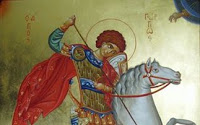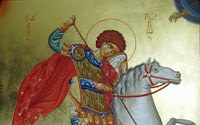Historians have not reached a specific date of birth of St. George, who is also called the Great Martyr and Trophy Bearer, while some have even questioned his historical existence. However, such views do not find suitable ground as both the Catholic and the Orthodox Church have many stories and narratives that claim the opposite.
Saint George is considered to have been born somewhere between 275 AD. and 285 AD. In the city of Lod, or in Greek Diospolis, 15 kilometers southeast of today's Tel Aviv. His father is said to have been a Greek senior Roman army officer named Gerontius of Cappadocia, while his mother was Polychronia of Palestine.
Due to his father's position, the family environment in which he grew up was noble, and due to the religious beliefs of his parents, George was brought up under Christian values. His parents wanted to name him by this name, placing him on earth (dedicated to the work of the earth). Only at the age of 14 George loses his father while a few years later he remains completely orphaned.
So the young George decided to go to Nicomedia, which was the imperial city of Diocletian and to serve in the emperor as a soldier. The emperor welcomed him with "open arms" as he also knew his father who had served in the Roman army. By the age of 20, George had risen because of his heroism and courage. Within a few years, he received the office of Trivounos, while Diocletian himself proclaimed him Duke with the title of Comet (count-colonel) in the Anikiori order of the imperial guard.
But the good relationship with the emperor lasted until the year 302. It was then that Diocletian decided by decree to force all Christians, especially the army, to be arrested and offer sacrifices to the Roman gods. George could not do such a thing from the moment he had been raised all his life with Christian values. He found the courage and went before the emperor and announced that he was not going to sacrifice.
It was difficult for Diocletian to punish him, he was, after all, one of his best Tribunes, and the son of one of his best friends. He offered him money, land and even slaves in order to offer a sacrifice, but George was adamant. Instead of accepting the offers, he rejected Diocletian's decree and shouted boldly that the only faith he had was in Jesus Christ. Disappointed, Diocletian decided to execute him, punishing him by example.
George's stubbornness led many more soldiers to decide to be baptized Christians. Before he was executed, the Saint gave all his property to the poor while he was psychologically prepared for the tortures that awaited him. The torture inflicted on him is terrifying. He was stabbed, then beaten, his skin removed with a special knife, and then thrown into a lime pit. George, however, remained alive and so they forced him to walk on burnt metal shoes.
Eventually his executioners beheaded him in front of the walls of Nicomedia. His execution took place on April 23, 303 AD. His body was transported to Lydda, Palestine, where his mother came from.
Precisely because he had a military life, Agios Georgios is called a Trophy Bearer, while he is a protector of the Greek Army. He was considered the patron saint of the Crusaders who brought his relic from Palestine to the West. He has endless stories and beliefs around his name in all countries of the world with the best known being the killing of a dragon in Libya.
Saint George is the patron saint of England, of the Christians of Palestine, of Beirut, of Georgia, of the Bulgarian Army, of Catalonia. While being the patron saint of England and on horseback, he was considered by the relevant legend as the patron saint of the Knights of the Round Table.
Source: Newsbeast.gr

